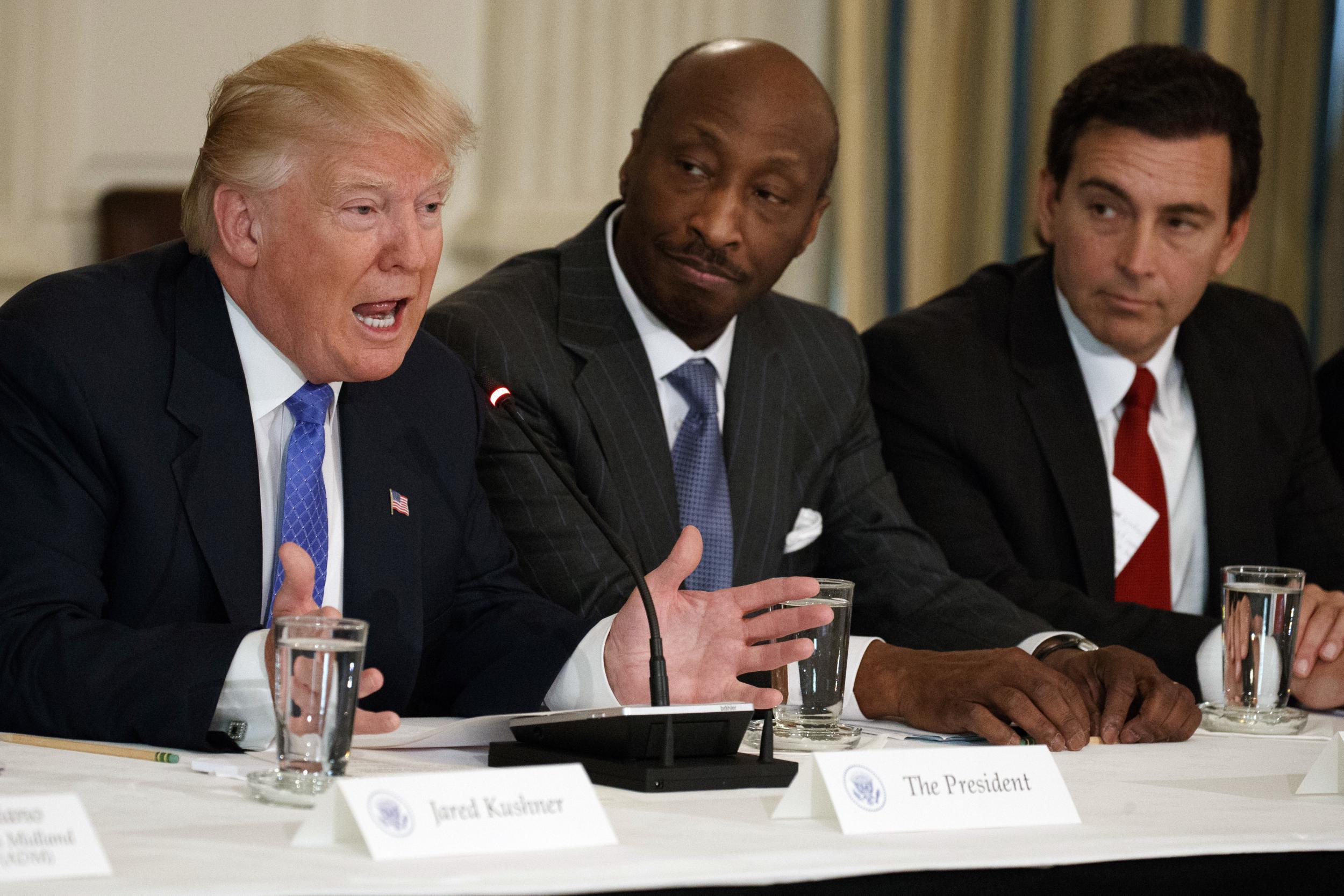Charlottesville: Three CEOs quit Trump advisory council in one day over response to white supremacist violence
President lashes out as company executives take stand against 'expressions of hatred, bigotry and group supremacy'

The chief executives of three major manufacturing firms have resigned from Donald Trump's advisory panel over the President's failure to swiftly condemn deadly white supremacist violence in Charlottesville.
The bosses of pharmaceutical giant Merck, computer company Intel, and sportswear manufacturer Under Armour quit the American Manufacturing Council within hours of each other on Monday, issuing pointed statements about the response of US leaders to "expressions of hatred".
Their resignations came two days after a neo-Nazi demonstration in Virginia left one anti-fascist protester dead and amid mounting pressure on the President to explicitly speak out against white supremacy.
Mr Trump later declared racism "evil" and said the Ku Klux Klan, neo-Nazis, white supremacists and other hate groups were "repugnant" in a new statement issued two days after the bloody rally.
Merck chief executive Kenneth Frazier's resignation from the council drew a much quicker response from the President, who tweeted that the executive would "have more time to LOWER RIPOFF DRUG PRICES!"
Mr Trump lashed out just 54 minutes after Mr Frazier, one of the few black Americans to head a Fortune 500 company, announced his departure from the panel "as a matter of personal conscience".
"America's leaders must honour our fundamental values by clearly rejecting expressions of hatred, bigotry and group supremacy, which run counter to the American ideal that all people are created equal," the executive said in a statement.
Mr Frazier added: "I feel a responsibility to take a stand against intolerance and extremism."

Intel chief executive Brian Krzanich cited his "abhorrence at the recent hate-spawned violence in Charlottesville" in a blog post announcing his resignation later on Monday.
"Earlier today I called on all leaders to condemn the white supremacists and their ilk who marched and committed violence," he said, adding in a pointed parting shot: "I resigned because I want to make progress, while many in Washington seem more concerned with attacking anyone who disagrees with them."
Under Armour chief executive Kevin Plank said his company "engages in innovation and sports, not politics" and did not specifically mention Mr Trump or Charlottesville, but said the firm would focus on promoting "unity, diversity and inclusion" through sports.
Many on social media, including business leaders, spoke out in support of the executives' resignations.
"Thanks @Merck Ken Frazier for strong leadership to stand up for the moral values that made this country what it is," said Unilever chief executive Paul Polman on Twitter.
The trio are not the first executives to resign from advisory councils serving the President.
Tesla chief executive Elon Musk quit the manufacturing council and two other advisory groups in June after the US withdrawal from the Paris climate agreement.
Walt Disney chairman and chief executive Bob Iger resigned for the same reason from the President's Strategic and Policy Forum, which Mr Trump established to advise him on how government policy impacts economic growth and job creation.
The manufacturing jobs council had 28 members initially, but it has shrunk since it was formed earlier this year as executives resign, retire, or are replaced.
William Galston, a senior fellow at the Brookings Institution, said he couldn't "think of a parallel example" of any President responding as viciously to a chief executive departing an advisory council as Mr Trump's attack on Mr Frazier.
"Usually, certain niceties are observed to smooth over a rupture," said Mr Galston, who served as a domestic policy aide in the Clinton administration.
He added: "We've learned that as president, Mr Trump is behaving exactly as he did as a candidate. He knows only one mode: When attacked, hit back harder."
Join our commenting forum
Join thought-provoking conversations, follow other Independent readers and see their replies
Comments